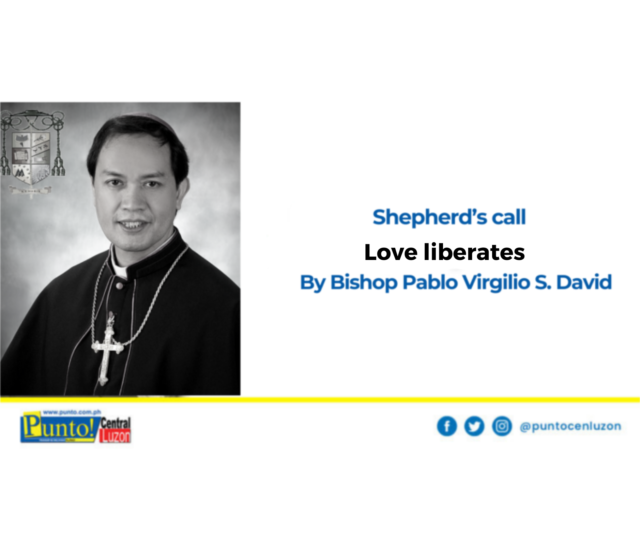WE HAVE a Filipino saying that goes, “Ang sakit ng kalingkingan ay ramdam ng buong katawan.” (In English: The pain of a little finger is felt by the whole body.) Is that true? I say, not always. It is true when the body is alive and well. There is no way a dead body can feel any pain. Or, if your body gets paralyzed, sometimes you will be unable to feel your hand or your foot.
Pain is, no doubt, an unpleasant experience we all try to avoid. And yet, medical science will tell you it is also a good thing, a good sign. A sign that your body is trying to cope, that it is trying to heal itself, that it is trying to repair some parts that may have been damaged.
Now apply this principle not just to the physical body. Apply it to the Church as a body. Even if we usually refer to the Church as a mystical body, its organic unity is not purely spiritual. It has very concrete physical implications too. St. Luke tells us the early Christian community had to deal with a very concrete problem: some of the Greek-speaking widows were being neglected in their daily distribution. Meaning, some of them were well-fed while others went hungry and nobody seemed to care. Aren’t we dealing with a similar issue in the midst of this lockdown?
The apostles felt the urgent need to address this issue. They called attention to it because if they allowed this to happen, it meant they had nothing to do with each other. And so, they appointed deacons who could serve as eyes and ears of the apostles, young people who would make sure nobody was left behind. You see, if we truly succeed in building a spiritual communion, this communion will express itself in community. Looking after the welfare of the last, the least and the lost will always be part of the dynamics of being Church.
A few days ago, I quoted the song NO MAN IS AN ISLAND. The inspiration for that song was actually a much older poem by John Donne. (With apologies to John Donne, and I hope you don’t mind, I took the liberties of making the language more inclusive.) Let me just quote the first and the last verses,
“No one is an island, Entire of itself;
Every one is a piece of the continent, A part of the main.”
“Anyone’s death diminishes me, because I am involved in humankind. And therefore, never send to know for whom the bell tolls; It tolls for thee.”
The pandemic has deprived us of our regular practice of GOING TO CHURCH. But this crisis has also become the opportunity to be reminded that CHURCH is not some place or building you go to. Church is who we are, who we become if we enter into communion with Christ. Remember what he said in Matthew 18:“For where two or three are gathered together in my name, there I am in the midst of them.”
We may be unable to gather together as the usual two or three thousand in one Mass because of the lockdown, but we can also turn our homes into places of worship, like we are doing at this very moment. I remember receiving a a forwarded poster with Satan on one side saying to God: “Haha, see, I was able to close down your Churches through this pandemic.” On the other side, God says: “Oh but I have just succeeded in turning every home into a Church.”
We reflected on the same Gospel reading just last Friday, remember? I called your attention to just that part where Jesus says, IN MY FATHER’S HOUSE, THERE ARE MANY ROOMS. I said, home is where we learn to make as much space for each other as we can, where we learn to accommodate each other in respect and care, in order to become the Father’s house.
We grow into that “spiritual temple” that Peter speaks about in our second reading, learning to make what he calls spiritual offerings acceptable to God. Meaning, doing as Jesus did, participating in his unique kind of priesthood in which the offerer and the offering become one. In the kind of priesthood that Christ represents, the priest does not say I will offer a lamb for you. Rather, he says, I will be both your priest and your lamb, I will offer my life for you.
Today happens to be MOTHER’S DAY TOO. It is the day we are reminded what mothers are to us—ilaw ng tahanan, the light of the home. Because they cared for us, we also learned to care for each other. A mother anticipates her children’s needs. She is usually the first to sense it when there’s a problem in the family, especially among her children. I remember my mother saying, whenever I asked her, “How did you know?” She said, “How could I not? You all came from me. You used to be part of me. You swam in my womb before you got out and went away.”
The American lady poet Maya Angelou says something like this in a reflection on WHAT LOVE IS ABOUT. She found herself recalling what her mother had taught her about love. Let me just paraphrase her. She said:
“Love liberates; it doesn’t just hold. That’s ego. I remember my mother telling me when I left home, ‘Remember this, you can always come home.’ When I messed up, she never said, ‘I told you so.’ I always felt welcome, nevertheless. She liberated me to life, she released me, freed me to see something in me that is of value not just to me. Later when she was dying, I found myself returning to her the care she had given me. But because I remembered her liberating me, I had this idea of hoping I could liberate her in return. I learned love from her, after all. Some people need permission to go, they need to be told, ‘I liberate you.’ Love liberates; it doesn’t bind. When mother said, ‘I love you, she meant, ‘That’s wherever you are.’ Of course, I’d love you to be near me, but that is not possible. You have a life to live, so go.’ That’s love.”
To be present to each other even when separated, that’s what Jesus also says in today’s Gospel. No doubt, we are troubled during moments of parting, when we experience separation, when people you love have to go or say goodbye. I don’t know why the song says “The trouble with hello is goodbye.” It should not be a trouble for lovers. For true lovers there are no goodbyes, because love is eternal. It is the only thing that does not die. I remember one philosopher saying, “To say I love you is to say, you will never die.” For the lover, there is always a RETURN. I am going away, but we will see each other again. The same philosopher I just mentioned, Gabriel Marcel, calls this return a “NOSTOS” (Greek term for “RETURN”). If I may add, every return is like the coming home Maya Angelou spoke about. It is “AS BEFORE, BUT DIFFERENTLY, EVEN BETTER THAN BEFORE.”
(Homily for Fifth Sunday of Easter, 10 May 2020, John 14:1-12)





